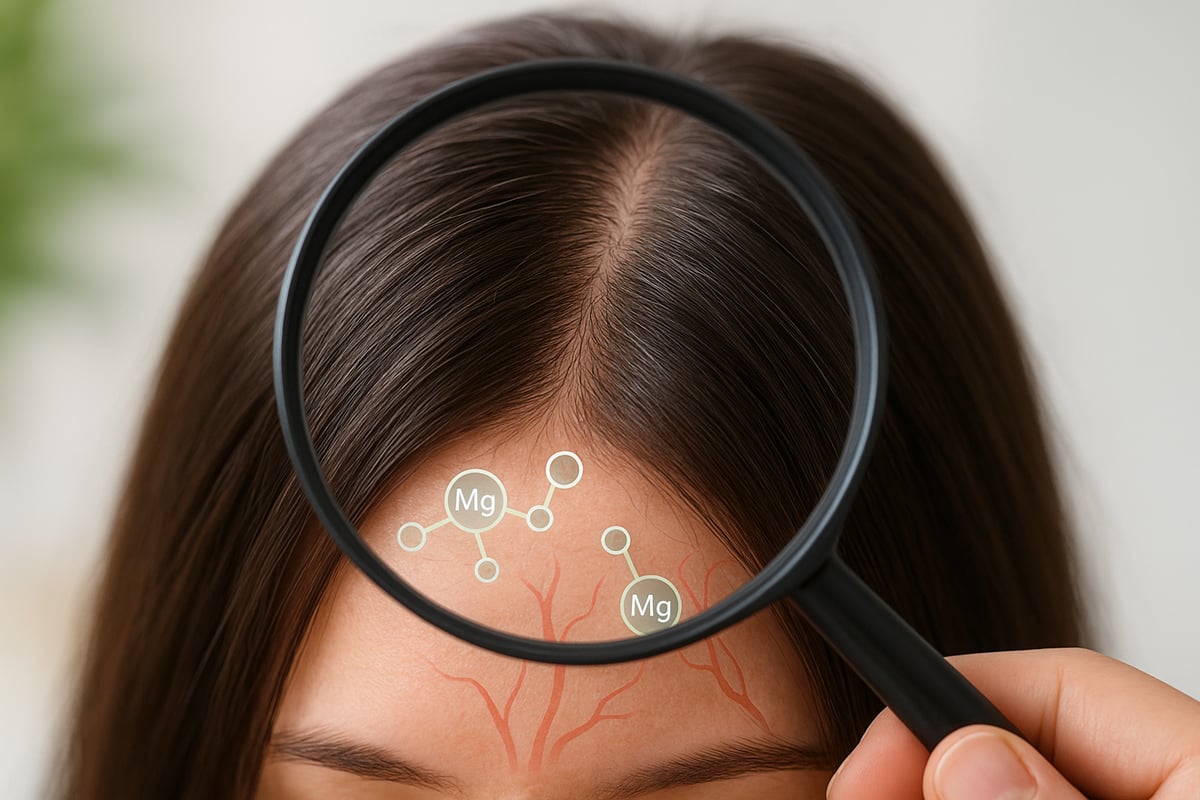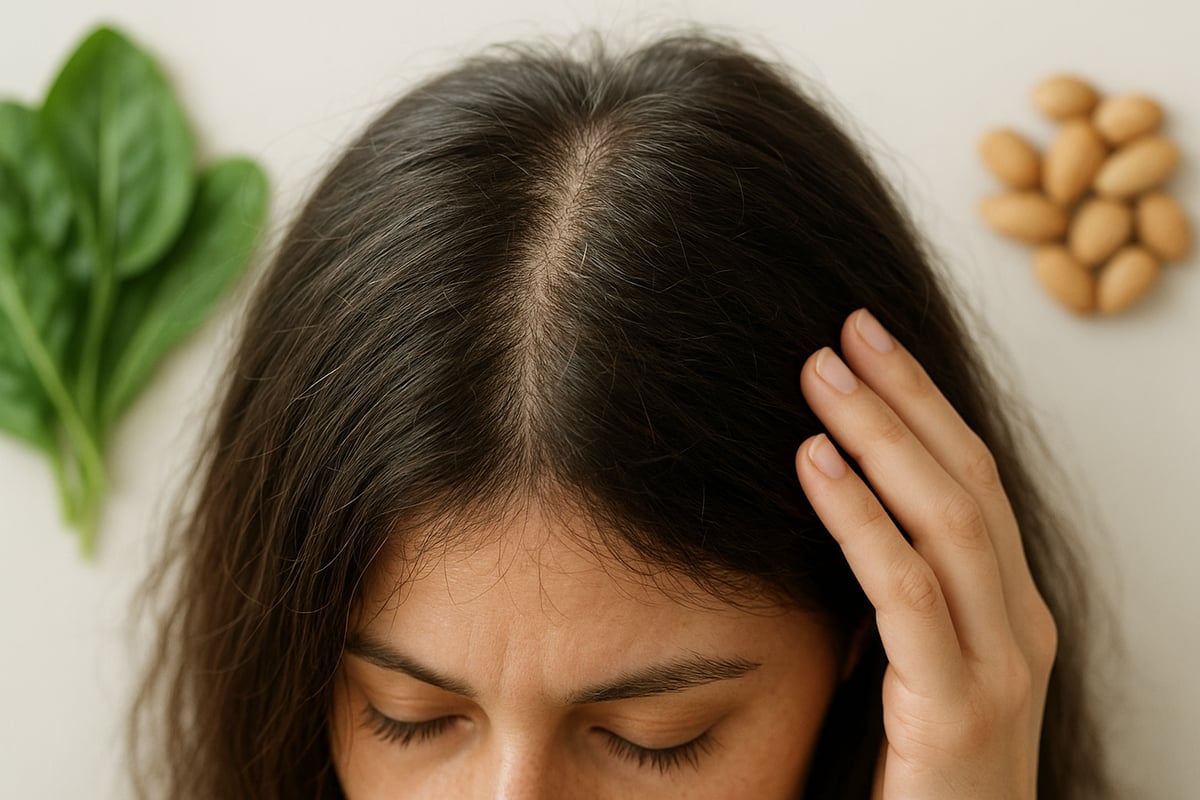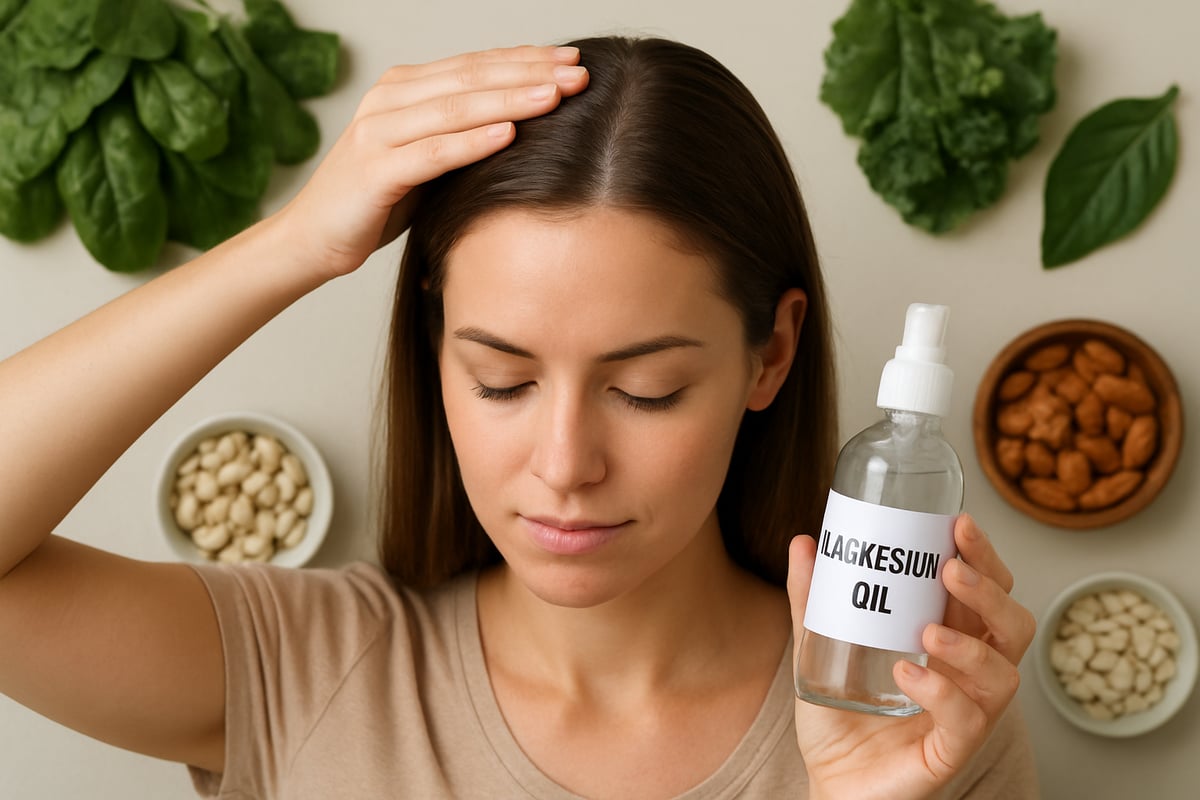Imagine revitalizing your hair with a single essential mineral. In 2025, magnesium and hair growth are at the forefront of healthy beauty routines, offering a natural path to stronger, fuller hair.
This guide will reveal the science behind magnesium and hair growth, the benefits you can expect, and how you can incorporate this mineral into your daily routine.
Discover the latest research, learn how to spot deficiency symptoms, and get expert tips to maximize your hair’s potential. Ready to unlock the secrets for healthier hair this year? Start your journey with magnesium and hair growth now.
The Science Behind Magnesium and Hair Growth
Magnesium and hair growth are more closely linked than many realize. This essential mineral is at the heart of healthy hair, working at the cellular level to keep your scalp and follicles in prime condition. Let’s break down the science and discover why magnesium could be the missing piece in your hair care routine.

Understanding Magnesium’s Biological Role
Magnesium and hair growth go hand in hand because magnesium is vital for over 300 enzymatic reactions in the body. It supports protein synthesis, which is essential for building strong hair strands. Without enough magnesium, cells cannot effectively produce keratin, the key structural protein in hair.
Magnesium also helps regulate the hair growth cycle. Hair follicles move through three main stages: anagen (growth), catagen (transition), and telogen (rest). Adequate magnesium keeps follicles in the anagen phase longer, promoting fuller, denser hair.
One overlooked benefit is magnesium’s role in scalp blood circulation. Better blood flow means more oxygen and nutrients reach the follicles, fueling steady hair growth. Magnesium also acts as a natural antioxidant, reducing oxidative stress and inflammation in the scalp. This helps protect hair follicles from damage, keeping them healthy and active.
Recent research points to a direct link between magnesium and keratin production. Stronger keratin means tougher, less breakable hair shafts. In fact, a comprehensive review of vitamins and minerals in hair loss highlights magnesium’s contribution to healthy hair structure and resilience.
Let’s summarize magnesium’s impact on hair in a quick table:
| Magnesium Benefit | Effect on Hair |
|---|---|
| Protein synthesis | Builds strong hair strands |
| Blood circulation | Delivers nutrients to follicles |
| Antioxidant action | Reduces scalp inflammation |
| Keratin production | Strengthens hair shaft |
| Cycle regulation | Prolongs growth phase (anagen) |
These biological roles make magnesium and hair growth an inseparable duo when it comes to scalp and follicle health.
How Magnesium Deficiency Impacts Hair
Magnesium and hair growth are also connected when it comes to deficiency. Modern diets, chronic stress, and digestive issues can all lead to low magnesium levels. Deficiency is more common than you think, affecting up to 50% of people in North America.
When magnesium drops, hair often pays the price. Common signs include thinning, brittle strands, and increased shedding. Many people also notice their hair loses its shine and grows more slowly. These symptoms occur because follicles become less efficient at producing keratin and staying in the active growth phase.
Low magnesium disrupts follicle function in several ways. First, it reduces blood flow to the scalp, starving follicles of nutrients. Second, it increases oxidative stress, making follicles more vulnerable to damage and inflammation. Third, it weakens the synergy between magnesium and other hair nutrients like zinc, iron, and biotin.
Clinical reports show that correcting magnesium deficiency can lead to visible improvements. People often report less shedding and stronger, fuller hair after dietary changes or supplementation. The relationship between magnesium and hair growth is especially strong in those who are already lacking this mineral.
Keep in mind, magnesium works best when balanced with other key nutrients. If you suspect a deficiency, consult a healthcare provider for proper testing and guidance. With the right approach, magnesium and hair growth can become a powerful partnership for healthier, more vibrant hair.
Signs You May Need More Magnesium for Healthy Hair
Have you noticed your hair looking dull, growing slowly, or breaking more easily? These can be early signs that your body might be running low on magnesium. Because of the close link between magnesium and hair growth, understanding the warning signals can help you take action before hair health declines.

Recognizing Deficiency and Its Effects
Magnesium deficiency can show up in your hair long before you notice other health problems. Some of the most common physical signs include dull hair, slow hair growth, breakage, and persistent scalp itchiness. These symptoms often appear together, making it easier to spot if you know what to look for.
Other clues that you may need more magnesium and hair growth support include muscle cramps, frequent fatigue, high stress, and trouble sleeping. These symptoms might seem unrelated, but they are often connected. Women, older adults, athletes, and people with digestive issues are particularly at risk for magnesium deficiency.
Chronic stress and a poor diet can quickly drain your body’s magnesium stores. Studies show that when stress levels rise, the body uses up more magnesium, which can directly impact hair strength and growth. If you are experiencing stress and noticing changes in your hair, it may be time to check your magnesium intake.
A simple self-assessment starts with observing your hair’s texture, rate of growth, and scalp comfort. If you notice changes, consider tracking your diet and symptoms. For a more accurate picture, a healthcare provider can order tests to measure your magnesium status. For more details on how nutrient deficiency affects hair health, see Diet and Hair Loss: Effects of Nutrient Deficiency and Supplement Use.
Latest Research: Magnesium and Hair Loss in 2025
Recent studies are uncovering new connections between magnesium and hair growth. In 2025, clinical trials have started to focus on how magnesium supplementation may improve hair density and reduce shedding. Early results suggest that correcting magnesium deficiency leads to stronger, fuller hair in many cases.
Dermatologists and trichologists now recognize that magnesium plays a key role in scalp health. Improved scalp circulation, reduced inflammation, and enhanced nutrient delivery are all benefits that support healthy hair growth. Some experts believe magnesium could be especially helpful for people dealing with stress-related hair loss.
However, research also shows that magnesium and hair growth are only part of the bigger picture. While supplementation can help, results are best when combined with a balanced diet, stress management, and other hair-friendly nutrients. Ongoing studies are still exploring the exact mechanisms, but the consensus is clear: magnesium is a vital piece of the hair health puzzle.
If you suspect you may be low in magnesium, consulting with a healthcare provider is the best way to determine your needs. They can recommend the right approach to restore your magnesium levels and help you regain healthier, more resilient hair.
How to Use Magnesium for Hair Growth: Methods and Best Practices
Unlocking the potential of magnesium and hair growth starts with understanding the best ways to incorporate this mineral into your daily routine. Whether you prefer dietary changes, topical treatments, or supplements, each method offers unique benefits for promoting healthier, fuller hair.

Dietary Sources of Magnesium for Hair Health
Food is a powerful way to support magnesium and hair growth naturally. Many everyday foods are packed with this essential mineral, helping you meet your daily needs while nourishing your hair from within.
Some of the top magnesium-rich foods to include are:
- Spinach, kale, and other leafy greens
- Pumpkin seeds, almonds, cashews
- Black beans, lentils, chickpeas
- Brown rice, quinoa, whole wheat bread
Here's a quick reference table for magnesium-rich foods:
| Food | Magnesium (mg per serving) |
|---|---|
| Pumpkin seeds | 168 (1 oz) |
| Spinach | 78 (1/2 cup cooked) |
| Almonds | 80 (1 oz) |
| Black beans | 60 (1/2 cup cooked) |
| Quinoa | 60 (1 cup cooked) |
Adults generally need 310-420 mg of magnesium daily, depending on age and gender. Eating a variety of these foods not only boosts magnesium and hair growth but also improves overall wellness. To enhance absorption, pair magnesium-rich foods with vitamin D and avoid excess calcium at the same meal.
Topical Magnesium: Sprays, Oils, and Hair Products
Topical application is gaining popularity for supporting magnesium and hair growth directly at the scalp. Magnesium sprays, oils, and leave-in products are designed to deliver the mineral where hair follicles need it most.
Applying magnesium oil is simple:
- Spray or apply a small amount onto your fingertips.
- Massage gently into the scalp, focusing on areas of thinning or dryness.
- Leave on for at least 20 minutes, or overnight for deeper absorption.
- Rinse or shampoo as usual if desired.
For sensitive skin, always patch test before full use. Start with two to three times a week, then adjust based on comfort and results. Many people find that combining magnesium oil with scalp massage helps increase blood flow, enhancing the effects on hair health.
To discover high-quality options, check out the Best Magnesium Sprays for Hair, which are formulated for safe and effective scalp use.
Oral Magnesium Supplements: Forms, Dosage, and Safety
For those who struggle to get enough magnesium from food, supplements can play an important role in supporting magnesium and hair growth. There are several forms to choose from, each with its own benefits:
- Magnesium citrate: Highly absorbable, gentle on digestion
- Magnesium glycinate: Calming effect, ideal for stress-related hair issues
- Magnesium oxide: Common, but less easily absorbed
Adults should aim for 200-400 mg per day from supplements, depending on their needs. Start with a lower dose and increase gradually if needed. Always consult your healthcare provider before starting, especially if you take medications or have a health condition.
Oral supplements can be combined with dietary and topical approaches, but avoid excessive intake, as too much magnesium can cause digestive upset. Balance is key for optimal magnesium and hair growth.
Combining Magnesium with Other Hair Growth Strategies
Maximizing magnesium and hair growth means looking at your hair care routine as a whole. Magnesium works best when paired with other nutrients like biotin, zinc, iron, and vitamin D.
Consider these holistic tips:
- Eat a varied, nutrient-rich diet
- Manage stress with regular exercise and mindfulness
- Stay hydrated for better scalp health
- Use gentle, natural hair products
A sample weekly routine might include magnesium-rich meals, topical scalp massages, and a daily supplement if needed. Track your progress over time, adjusting your approach for the best results.
Remember, consistency is crucial. When you integrate magnesium and hair growth strategies into your lifestyle, you set the stage for stronger, healthier hair in 2025 and beyond.
Common Myths and Facts About Magnesium and Hair Growth
Curious about magnesium and hair growth? With so much buzz online, it’s easy to get swept up by bold claims. Let’s separate fact from fiction so you can make informed choices for your hair health.

Myth vs. Fact: Can Magnesium Alone Cure Hair Loss?
Myth: Magnesium alone can cure all types of hair loss.
Fact: While magnesium and hair growth are connected, magnesium is just one piece of the puzzle. Most experts agree that nutrition, genetics, hormones, and scalp health all play crucial roles. Magnesium supports healthy follicles, but it cannot reverse every cause of hair thinning or balding.
Many people with hair loss have multiple contributing factors. For best results, magnesium should be part of a balanced approach, not a stand-alone solution.
Myth vs. Fact: Topical vs Oral Magnesium and "More is Better"
Myth: Topical magnesium is always better than oral supplements.
Fact: The best approach depends on your needs. Some people absorb magnesium well through the skin, while others benefit more from oral supplements. Both methods can support magnesium and hair growth, but effectiveness varies by individual.
Myth: Taking more magnesium will make your hair grow faster.
Fact: Excess magnesium can cause side effects like digestive upset. More is not always better. The key is reaching optimal levels, not going overboard.
Myth vs. Fact: Pattern Baldness and Misinformation
Myth: Magnesium can prevent or cure male or female pattern baldness.
Fact: Pattern baldness is largely genetic and hormonal. While magnesium may help improve scalp health and reduce inflammation, it cannot change your genetic blueprint. It’s important to set realistic expectations for magnesium and hair growth, especially for hereditary hair loss.
What Science and Clinical Data Actually Show
Clinical trials suggest magnesium supports hair strength and reduces shedding, but results vary. There is no evidence that magnesium alone delivers dramatic regrowth for everyone. For a deeper dive into science-backed benefits and common misconceptions, visit the Benefits of Magnesium for Hair.
Be cautious about advice from social media or non-scientific sources. Look for studies, expert opinions, and real data before changing your routine. Magnesium and hair growth are linked, but only as part of a holistic approach to wellness.
Expert Tips for Maximizing Hair Growth with Magnesium in 2025
Unlocking the full benefits of magnesium and hair growth requires a thoughtful plan and commitment. By following expert-backed strategies, you can support your journey toward thicker, healthier hair. Start with a holistic approach that considers your unique needs, lifestyle, and the best ways to incorporate magnesium and hair growth techniques into your routine.
Creating an Effective Hair Growth Plan
Begin your magnesium and hair growth journey by consulting with a healthcare professional or trichologist. Personalized advice ensures you choose the right magnesium methods, whether dietary, topical, or supplements. Track your progress with before-and-after photos or hair density measurements to see real changes over time.
Adapt your magnesium and hair growth routine to your hair type and scalp condition. For example, those with dry scalps might benefit from magnesium oil massages, while others may prefer dietary sources. Balance magnesium intake with other key nutrients such as zinc, biotin, and iron for optimal hair health.
Lifestyle plays a big role in magnesium and hair growth success. Prioritize stress management, quality sleep, and hydration to maximize results. Scalp massage, mindfulness, and regular self-care can improve magnesium absorption and boost follicle activity.
Avoid common pitfalls like overusing magnesium products or choosing low-quality options. Consistency is key, so stick with your routine and give your hair time to respond. Explore trusted products in the Hair Care and Growth Collection to find magnesium-based solutions that fit your plan.
Remember, magnesium and hair growth improvements take time, but a well-structured plan increases your chances of success.
Real-World Success Stories and Testimonials
Many individuals have seen positive changes in their hair after focusing on magnesium and hair growth strategies. For instance, women experiencing diffuse hair loss have reported thicker, fuller hair after correcting magnesium deficiency, as highlighted in this study on serum magnesium levels and hair loss.
Success stories often include a combination of dietary changes, topical magnesium applications, and a commitment to stress reduction. Consistent use and patience are common themes among those who achieve the best results. Some users found that pairing magnesium with scalp massage or other nutrients accelerated their progress.
However, not every attempt yields immediate results. Lessons from failed routines include not tracking progress, skipping days, or neglecting other aspects of health. Experts recommend integrating magnesium and hair growth strategies into a daily self-care routine for sustained benefits.
Trichologists emphasize that while magnesium and hair growth are closely linked, individual differences matter. What works for one person might need adjustment for another. The key is to remain patient, informed, and open to tweaking your approach for lasting results.
Frequently Asked Questions About Magnesium and Hair Growth
Curious about magnesium and hair growth? Here are the answers to the most common questions, based on science and expert guidance.
How long does it take to see results from magnesium and hair growth routines?
Most people notice visible changes in hair strength and texture within 8 to 12 weeks. Consistency is key, since hair growth cycles take time. Results may vary based on your starting magnesium status and overall hair health.
Can magnesium help with all types of hair loss?
Magnesium and hair growth are closely linked when hair loss is related to deficiency, stress, or poor scalp health. However, not all types of hair loss respond the same. For example, genetic conditions like male or female pattern baldness may not improve solely with magnesium. Some research, such as this review on micronutrients and alopecia areata, highlights the role of minerals in supporting scalp health, though more studies are needed for definitive answers.
Is it safe to use magnesium oil on color-treated or sensitive scalps?
Most people tolerate topical magnesium well, but always patch test first. Those with sensitive skin or scalp conditions should use caution and consult a dermatologist before adding new products.
What are the side effects of too much magnesium?
Oral magnesium supplements can cause stomach upset, diarrhea, or cramps if overused. Topical products are less likely to cause side effects, but irritation is possible. Always follow recommended dosages for magnesium and hair growth, and talk to your doctor if you have kidney issues or take medications.
Do I need both oral and topical magnesium for best results?
Some find combining oral and topical approaches enhances magnesium and hair growth benefits. However, your needs may depend on diet, absorption, and personal goals. It is not essential to use both, but integrating them can provide a well-rounded routine.
Can children and pregnant women use magnesium for hair growth?
Children and pregnant women should consult healthcare providers before starting any magnesium and hair growth regimen. Safe dosages differ by age and condition, so professional guidance is important.
How does magnesium compare to other popular hair growth supplements?
Magnesium supports hair health, but it works best alongside other nutrients like zinc, biotin, and iron. Some people also combine it with natural oils, such as rosemary oil, which has its own hair-boosting properties. For more details, see this Rosemary Oil for Hair Growth guide.
Where can I find high-quality magnesium hair products in Canada?
Look for reputable wellness brands offering pure, tested magnesium oils and sprays. Check for products free from harsh chemicals, and read reviews to ensure quality and effectiveness.
Still have questions about magnesium and hair growth? Speak with a healthcare professional or a trichologist for personalized advice.
Now that you understand how magnesium can make a real difference for your hair in 2025, why not take the next step toward healthier, fuller locks? At Nuvo Wellness, you’ll find 100% natural magnesium sprays and hair oils—all crafted in Canada without any harsh chemicals, artificial fragrances, or preservatives. It’s a simple, effective way to support your hair and scalp, especially if you want to see visible improvements without compromising on purity. If you’re ready to start your journey to stronger hair, Try it Now and see the difference for yourself.

